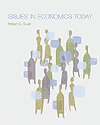| budget deficit | The amount by which revenues exceed expenditures.
|
 |
 |
 |
| budget surplus | The amount by which revenues exceed expenditures.
|
 |
 |
 |
| capital budget | That part of the federal budget devoted to spending on goods that will last several years.
|
 |
 |
 |
| cyclical deficit | That part of the deficit attributable to the economy's not being at full employment.
|
 |
 |
 |
| national debt | The total amount owed by the federal government.
|
 |
 |
 |
| off-budget | Parts of the budget designated by Congress as separate from the normal budget. Programs that operate with their own revenue sources and have trust funds; Social Security, Medicare, and the Postal Service are examples.
|
 |
 |
 |
| on-budget | Parts of the budget that rely entirely or mostly on general revenue.
|
 |
 |
 |
| operating budget | That part of the federal budget devoted to spending on goods and services that will be used in the current year.
|
 |
 |
 |
| peace dividend | Money that was freed for other spending priorities when the Cold War was over.
|
 |
 |
 |
| procyclical | Situation that renders good times better and bad times worse.
|
 |
 |
 |
| structural deficit | That part of the deficit that would remain even if the economy were at full employment.
|




 2003 McGraw-Hill Higher Education
2003 McGraw-Hill Higher Education